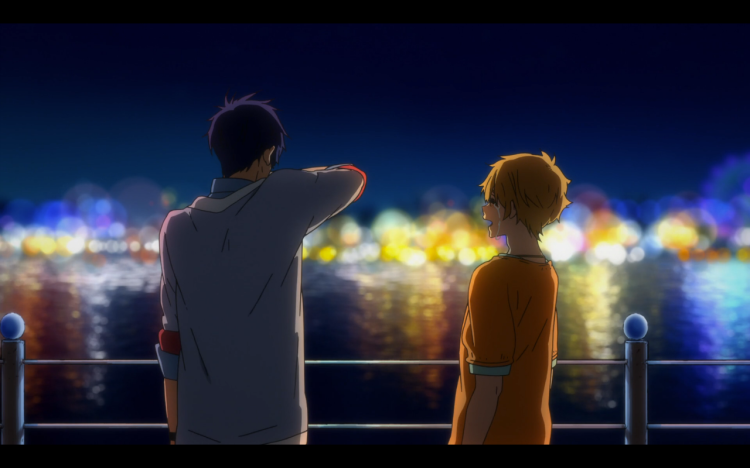Music is a very important part of how I experience anime, and film media in general. It’s something that I find is often underdiscussed among fans, and as a musicologist who focuses on film scores, I find that a shame. It’s a very key part of any film work’s emotional experience, just one that succeeds too well to the point that it slips under our noses. It’s usually subliminal, and on top of that, a lot of people don’t know how to talk about music. Well, I do, and since I already wrote up a top five favorite series of the year post for ANN, this one covers my favorite TV anime soundtracks of 2014.
I’ve been promising this post for a while, so here it is in the first of two parts. I kept getting delayed partly because choosing my favorite background music is such a difficult endeavor. There’s so much to consider: not only the quality of the music itself, but how it fits with the atmosphere of the show, and how the show uses it. (I should note: this is purely judging on stuff that was in the runtime of the episode, not OPs and EDs.) There were about four shows that I floated that didn’t make the list (that I might discuss in the second post as “honorable mentions”). Here are the ones that did, and why, starting with #10-6:
10. Your Lie in April:
Composer (of original material): Masaru Yokoyama (Arakawa Under the Bridge, Rolling Girls)
As a show about classical music, it’s predictable to put Your Lie in April on here, I suppose. Of course it has good music, with all the classics in its repertoire, and of course it uses them well, since the characters are performing them and usually picked them for highly personal reasons. (One such example in the above clip, where Kaori plays a piece by Beethoven. Both her and Kosei choose Beethoven pieces early on, representing their tortured paths to and forms of artistry.) Yet, the show’s original score also shines brightly, full of ambient minimalism as a backdrop to its many personal and psychological scenes. Even beyond the Beethoven and Chopin, Your Lie in April’s music is worthy of a standing ovation.
9. Mushi-shi: The Next Chapter:
Composer: Toshio Masuda (Naruto)
A lot of Mushi-shi is an exercise in “less is more,” and that’s as true with its music as it is with anything else. Mushi-shi is very minimally scored, preferring to let the sound effects of nature do its talking for it a lot of the time. So when it does have music, it can be quite striking, even if it’s just a quick motif on a solo instrument. The dissonant chimes that come in whenever Ginko starts explaining the mushi-of-the-week are jarring, shaking awake the viewer and the feature character to listen to his explanations for the cosmic-horror-of-the-week. Yet, its music can also gently sing you to sleep again, as in the lullabies that drift into the ending credits. The track I picked is one that falls somewhere in the middle, usually coming in as the mushi works its magic. Mushi-shi’s score is pure leitmotif, only coming out sparingly for a very singular idea or mood, like the shy mushi themselves.
8. Monthly Girls’ Nozaki-kun:
Composer: Yukari Hashimoto (Penguindrum, Yuri Kuma Arashi, Toradora!)
The slice-of-life comedy genre rarely climbs to the top of OST lists, since so much of it leans toward the predictable. It’s the same gentle piano flourishes with maybe a bit of bouncy pop when things get silly. Nozaki-kun had some of this, but it was always memorable and original in its own way. This was especially true in its choice of instruments. The tuba is the best comedy instrument, and it was the perfect accent for Nozaki, the deep-voiced stoic with a silly streak. Why don’t more comedy anime use the tuba? Why don’t more everything use the tuba?
7. Rage of Bahamut: Genesis:
Composer: Yoshihiro Ike (Ergo Proxy, Tiger & Bunny)
Like everything in Bahamut, its music sounds like a big Hollywood movie: from the frantic strings for rising action to the ominous choruses for big reveals. It’s the sort of epic fantasy scoring you’d expect in your Lord of the Rings and other movies about long journeys to fight CGI dragons or orcs, because that’s the sort of beast that Bahamut is. I think my favorite and most memorable part of the score is all the weird little western flourishes whenever Favaro did something badass, like trumpet fanfares. It’s not as creative as I initially expected it to be, which is why it isn’t higher on this list, but there’s a lot to love about Bahamut’s music anyway.
6. Kill la Kill:
Composer: Hiroyuki Sawano (Attack on Titan, Aldnoah.Zero, Blue Exorcist)
I didn’t do a 2013 list, so I decided to include shows that started then but continued into the next year–and with those parameters, I couldn’t not include Kill la Kill. It had some of the most memorable and fun OST tracks in a long time, the kind that fans download right along with the OPs and EDs. Personally, I wasn’t always a fan of the way the music was used in the series’ first cour, but it picked up steam by the time January rolled around. The musical styles fit the series like a glove: They could range in mood from silliness to pumping you up, but the score was always as bombastic as what was happening on screen. Like a lot of Kill la Kill viewers, my favorite track by far was Ragyo’s leitmotif, “Blumenkranz” (linked above), the singer’s clumsy German pronunciation aside. Hiroyuki Sawano sure has a knack for bringing the musical energy to battle-centric popular favorites.


